#1914 approaching rapidly i fear
Photo

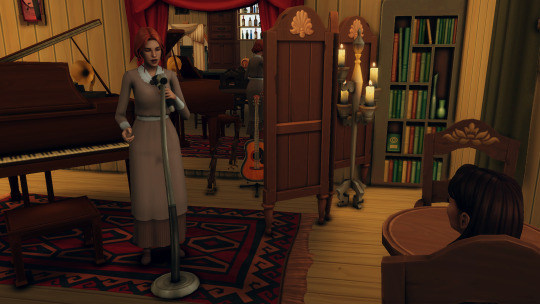
A bored Loretta and Dorothy decided to head into town together. The lounge seemed to be the best place to showcase their musical prowess. (as you can see the crowd went absolutely wild)


Joey turned 18 and apparently i took no pictures of him blowing out his candles,,, pensive. Anyways here's him admiring an umbrella and eating his birthday cake.

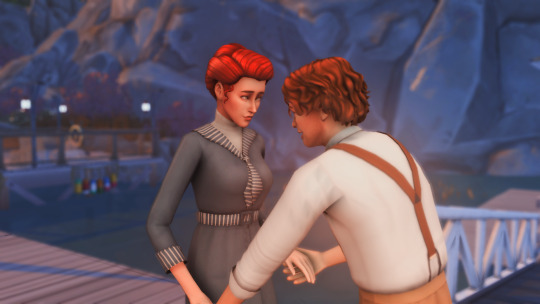
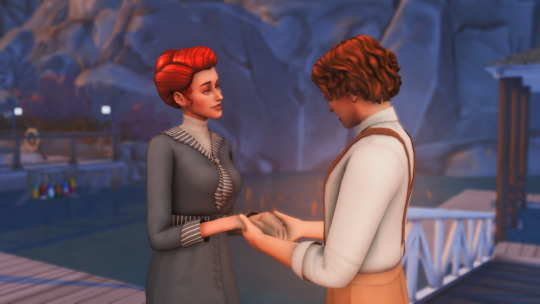
On Emilie’s birthday Joey took her down to the docks at sunset.


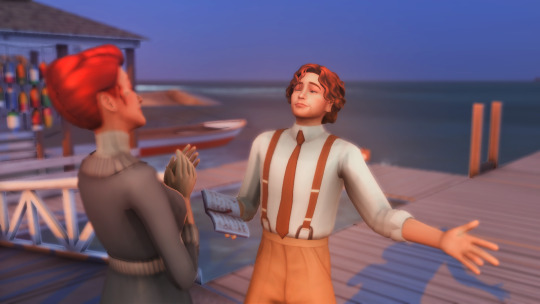
Who knew Joey was such a romantic!


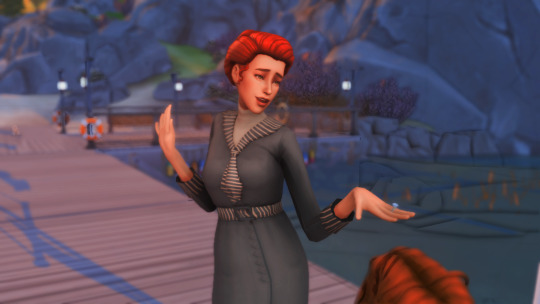
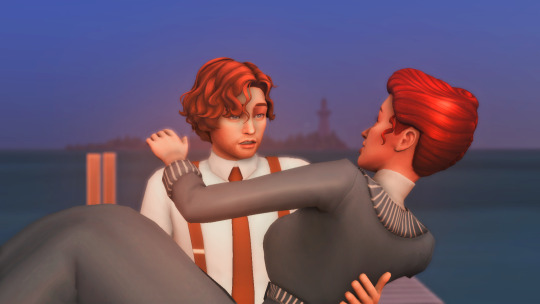
She said yes <3


In other news, Edith is still pregnant (quite heavily might i add) and little Theo aged up !!

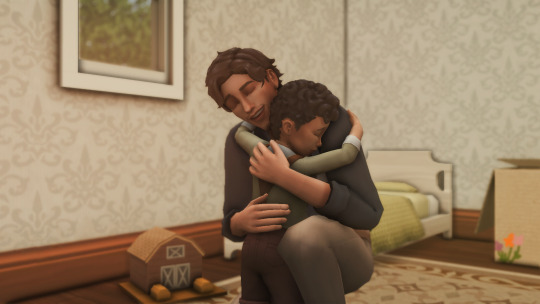
He’s the spitting image of his dad, curly black hair and all.




Not long after laying down for a nap Edith went into labor. With more experience there were fewer questions and fewer worries.

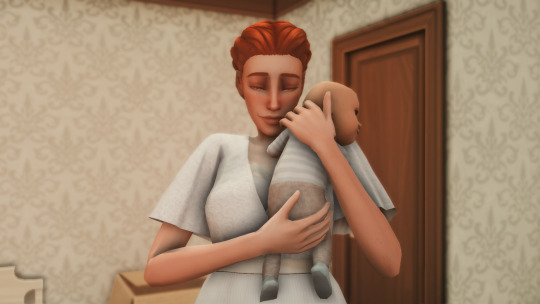
Vincent Joseph Lovings was born in the winter of 1912.
#ts4 decades challenge#ts4 history#sims 4 decades challenge#sims 4 history#ts4 legacy#sims 4 legacy#the decades challenge#The Lovings Legacy#1910#Loretta Lovings#Dorothy Lovings#Joey Lovings#Emilie Corrigan#Theodore Elkins#Robert Elkins#Vincent Lovings#bit longer cause last one was short#1914 approaching rapidly i fear#lets enjoy the happy while it lasts#ALSO PLEASE DONT TALK ABOUT HOW BAD THE RESHADE LOOKS#EDITH IS LITERALLY GLOWING AND NOT IN A GOOD WAY
8 notes
·
View notes
Text
comment on my post:

aside from, like, their infamous social world of nepotism/king-making and their long history of training eugenicists who legitimized scientific racism; lawyers who built legal frameworks for slavery/Jim Crow stuff; and economists who justify continued disenfranchisement, poverty, military interventions/invasions? here’s some of the more recent stuff i’ve been reading.

-------

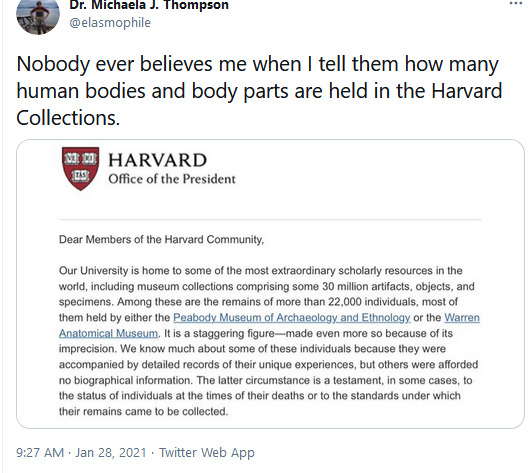
-------
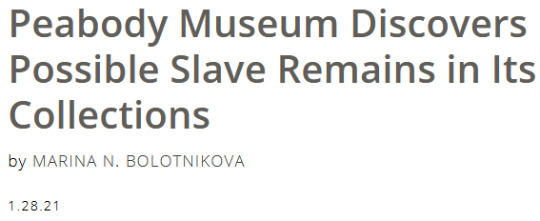
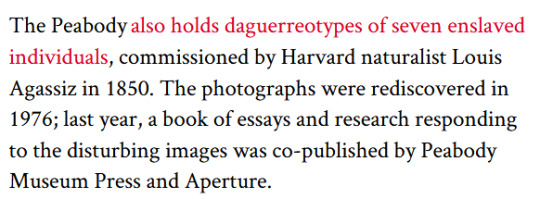
-------

Source: Caio de Freitas Paes, translated by Roberto Cataldo, published by Maria Salazar. “Harvard fund evades justice in land-grabbing case over Cerrado farm.” Mongabay Brazil (Portuguese): 7 October 2020. Mongabay (English): 15 October 2020.
-------

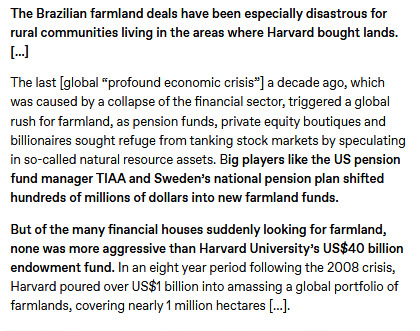
Source: GRAIN and Rede Social de Justica e Direitos Humanos. “Harvard’s land grabs in Brazil are a disaster for communities and a warning to speculators.” 8 May 2020.
-------
In 1914 Richard P. Strong, recently appointed director of Harvard’s new Department of Tropical Medicine, told a reporter from the Boston Evening Transcript that “the troubles to be feared from the spread of tropical diseases by traffic through the Panama Canal are rather heavy financial losses through disturbance of trade [rather] than any great loss of life.” [...] Nearly all of the department’s expeditions were to industrial plantations in the making. It is not by coincidence that Strong characterized the department’s work as industrial hygiene. [...]
[I]t was precisely the infrastructures of multinational firms like United Fruit Company, Firestone Tire and Rubber Company, and American petroleum companies overseas that Strong regarded as ideal assets in pursuing the kind of [...] research he envisioned.
In 1914, just one year after the creation of Harvard’s Department of Tropical Medicine, Strong took on an additional assignment that cemented the ties between his department and American business interests abroad. As newly appointed director of the Laboratories of the Hospitals and of Research Work of United Fruit Company, he set sail in July 1914 to United Fruit plantations in Cuba, Guatemala, Honduras, Costa Rica, and Panama. [...]
The Panama Canal, Strong recognized, had the potential to transform the economic and geopolitical fate of nations through the worldwide redistribution of disease. Anticipating the increased trade relations and movement of disease that the Panama Canal would bring, and influenced by the recommendations and financial backing of Harvard alumni such as Philippine governor Gen. William Cameron Forbes and patrons such as Edward Atkins, who were making their wealth in the banana and sugarcane industries, Harvard hired Strong, then head of the Philippine Bureau of Science’s Biological Laboratory, and personal physician to Forbes, to establish the second Department of Tropical Medicine in the United States (Tulane University established the first). [...]
As a shareholder in two British rubber plantations, Strong was acutely aware of the threat that Britain’s rubber monopoly posed to America’s economic interests. Strong approached Harvey Firestone, chief executive of the tire and rubber-processing conglomerate that bore his name, in December 1925 with a proposal to conduct an extensive biological and medical survey of the interior region of Liberia. Strong found a receptive ear. Firestone had negotiated tentative agreements in 1925 with the Liberian government for rights to a 2,000-acre plantation for experiments in rubber production, as well as a 99-year concession to optionally lease up to a million acres of Liberian land [...]. The biological and medical survey of Liberia undertaken by the Harvard scientists on behalf of Firestone, and ecological ideas of disease arising from their encounters with life in the tropics and work on industrial plantations, aided in altering the economy of nature and a nation. [...]
Strong and Forbes both left Manila for Boston in 1913. Strong began assembling a team of researchers and a course of instruction to take advantage of the increasing overseas presence of US firms. Forbes became an overseer to Harvard University and a director of United Fruit Company, the agricultural products marketing conglomerate best known for its extensive holdings of banana plantations throughout Central America. [...]
In 1912 United Fruit controlled over 300,000 acres of land in the tropics and had a net revenue of more than $5 million annually, holdings and profits that rapidly escalated over the next decade. With access to eight stations in different locales, free transport on company steamships, exposure to a wide variety of clinical conditions, and a ready supply of biological samples taken from the company’s hospitals and surrounding plantations, Strong boasted that no “tropical school of medicine in the world … had such an asset.” “It is something of a victory for Harvard,” he argued. “We could not for a million dollars procure such advantages.”[...]
-------
Source: Gregg Mitman. “Forgotten Paths of Empire: Ecology, Disease, and Commerce in the Making of Liberia’s Plantation Economy ...” Printed January 2017 in Environmental History. Originally published: December 2016.
320 notes
·
View notes
Text
Buttercup Part 9/?
Word Count: 1914
Warnings: None?
Masterlist
The end of November was around the corner, which meant that Sophia’s birthday was approaching rapidly. Seventeen didn’t seem particularly special, but Sweet Pea was eager for the day to come. Every day he pestered her with new questions as he sought to be certain that he was going to give her the greatest gift. Today was no different. They sat on the floor in his living room, both with books cracked open. Sweet Pea, however, was having trouble focusing on his studies.
“Why can’t you pick a favorite color? You can’t have multiple favorites. That defeats the entire purpose.”
Sophia rolled her eyes and turned to tell him something sassy. He’d been harping on her all week, ever since she said that her favorite color depended on her mood. She wasn’t expecting him to be so close or his eyes to be so earnest.
“Brown,” she breathed.
“Brown? Okay, now what girl picks brown as her favorite color? Shouldn’t it be like pink or something?”
“Brown is a nice color!” Sophia blushed, “It’s warm and comforting. Sometimes it has gold in it. It’s just got a bad rep.”
Sweet Pea stared at her for a moment, puzzled. Then his expression cleared, and he leaned closer, capturing her mouth with his. When he pulled away, he kept his eyes locked on hers. The moment felt intimate, and it made her heart rate start to increase. Before she could lean into him again, he whispered, smugly:
“I do have great eyes, don’t I?”
And she shoved a hand into his chest. He’d been crouched beside her, so the move sent him rolling backwards. Easily he turned the fall into a somersault and came to rest on his feet again, safely out of reach. He cocked an eyebrow mischievously and Sophia knew that she was going to find herself pinned and tickled in about five seconds. She’d just sprung to her feet, intent on hiding in the house, when his phone rang. Sweet Pea cursed as she smirked. She threw herself lazily on the couch while he took the call in another room.
As she was sitting there she looked over the room. After realizing that his father didn’t come home anymore, Sophia had decided the place could use a woman’s touch. Slowly, without being obvious to Sweet Pea, she’d begun to clean up around the place. Her eyes trailed over the walls, taking in the patched holes. The most recent one was less than a week old. While Sweet Pea was working to improve his anger, it wasn’t perfect. It was much better, but still, he had his moments. Last week, they’d had a fight, something so stupid that she couldn’t remember what it was about, but Sweet Pea had punched the wall in the middle of the argument.
When he returned from the call, Sweet Pea found her tracing the spot on the wall. He shuddered, not proud of losing control. She’d said it was okay, that she forgave him, but she’d looked terrified. They’d talked for a long time afterwards and he was working on it. She promised that she would do her best to work through this with him, if he never hit her. He felt nauseous again just thinking about that idea, but he couldn’t blame her for specifying. He’d shown her time and time again that he had no qualms settling arguments with his fists, but she was different. She was making him different.
She jumped slightly as his arms wrapped around her waist. He pulled her into him, his chest pressed firmly against her back. Her hands went over his and they stared at the spot together, in silence. His chin rested on her head and he took a deep breath.
“I’m sorry.”
“I know. You don’t need to keep apologizing, P”
“I do,” he said, turning her to face him, “I promised I’d be what you deserve. That was not it.”
“So, do better,” she smiled encouragingly. It had bothered her immensely in the moment, but she remembered his gentleness at other times. He wasn’t his anger and she had promised herself to keep reminding him of that, unless he would hurt her, which, she never believed would happen.
“You make me better.” He pulled her into a bone crushing hug.
Sophia’s birthday started out on the best note it had in a long time. Fangs woke her up by chucking several wrapped gifts at her head, and Rachel had her favorite breakfast prepared. She was halfway through unwrapping a pair of fuzzy socks when there was a knock at the door. Rachel went to answer it, but quickly called for Sophia. In the doorway was Sweet Pea, bearing a bouquet of flowers and looking like he’d rather be anywhere else.
“These are beautiful, Sweet Pea. What are they?”
Sweet Pea didn’t answer, but Sophia noticed a slight reddening of his cheeks. Seeing him embarrassed was something new entirely, which left her even more confused. Flowers are a pretty standard gift for a significant other. Rachel shook her head laughing as she realized the Serpent wasn’t going to answer.
“They’re Sweet Peas, Sophia.”
Sophia giggled then, realizing Sweet Pea’s dilemma. She took them from the awkward giant who became more relaxed immediately. Rachel took them from her and went off to find a vase, still shaking her head over the budding romantic. Sophia slipped her arms around Sweet Pea, under his leather jacket.
“Thank you,” she breathed into his chest.
“You really like them? I wasn’t sure. It felt like too much, but Toni swore it was good idea.”
“You really need to just listen to Toni more,” Sophia chided, rolling her eyes.
“Yeah, yeah, but now we have part two and I asked no one about that one.”
“Part two?”
Sophia glanced around, expecting to see a wrapped package. Sweet Pea realized her expectation and his face tightened slightly.
“It’s, uh, it’s nothing wrapped. I mean, I could get you something, but I didn’t know, and I thought I could. I dunno.”
Sophia brought her hands around his neck, pulling his forehead to hers. She’d learned that his anger, at least with her, was driven by uncertainty. He’d never truly tried to be in a relationship, to care about someone else. When that felt threatened, he got scared which quickly morphed into anger. Holding him like this and breathing deeply helped him to see straight again, to breathe.
“Sorry,” he muttered, avoiding her eyes.
“It’s alright! Now, what’s part two?” She smiled brightly as if the moment hadn’t happened.
“C’mon,” he answered, pulling her out the door. They were a block from the park when he threw her over his shoulder and demanded that she close her eyes. It was mildly uncomfortable being over his broad shoulder, but she was a good sport. After warning her to keep her eyes closed, he placed her on the ground.
“Open,” his voice shook.
Sophia’s mouth dropped open with her eyes. Four swings blew gently in the November air. A mural had been spray painted against the building that held the bathroom, the doors of which had been replaced. The empty beer bottles and littered jingle jangle pouches were gone. The wild grass no longer tickled her ankles. A new ladder gleamed beside the old slide. The play ground was empty, but it looked welcoming now.
“Look,” Sweet Pea pointed to the left of the building. A new sign, deep brown in color, was placed near the entrance. It declared the park to be a gift from the Serpents to the South Side.
She turned to face him and the joy on her face took his breath away.
“You fixed the park for me? That’s insane.”
“You love coming here, but you always seem sad when you look around. I thought maybe you wanted to see it fixed up.”
Sophia realized then that he still didn’t understand how much she appreciated the gesture. She threw her arms around his neck and brought his lips to hers, kissing him forcefully. His hands trailed down to her thighs, pulling her up. Her legs wrapped around his waist, helping to support herself. She pulled away reluctantly, giggling at his stunned expression.
“I love it, Sweet Pea. The flowers, repairing the park, it’s perfect. Thank you sooo much.”
As they approached the school, Sweet Pea dropped her hand. It was no secret that she arrived with the Serpent(s) every day, but he was insistent on keeping their relationship private. Deciding she didn’t want to argue on her birthday, she accepted the distance, throwing an arm around Toni and taking guesses at her gift. The Serpent revealed nothing, only making her promise to come to the Wyrm that night.
It was a good day, as far as days at South Side High could be. At least, it was, until final period rolled around. Sophia had study hall, her established routine being to gather up all her books and take them to the auditorium, that way she could meet up with everyone right at last bell without having to loop the school. Today, she realized she’d forgotten her English assignment. At final bell, she hurried to her locker, telling the group she’d meet them outside. As she was loading her bag, Romeo and Juliet slipped through her fingers and bounced off the floor. When she bent to pick it up, a large hand beat her to it.
“Thanks,” she smiled, raising her eyes to those of her helper. It was Eli, a boy who shared a few classes with her. They’d spoken a few times in passing. His eyes crinkled at the corners as he smiled softly.
“Sure thing.”
Sophia closed her locker with a snap, and the boy fell into step beside her. It made her feel uneasy at first, but then she learned that he had transferred from the North Side a year ago. She brushed away the fear of Sweet Pea’s reaction, enjoying the easy banter as they reminisced. Just as they exited into the small courtyard before the parking lot, he stopped her.
“Maybe we could talk more over dinner sometime?”
“Oh, uh…” Sophia froze. Cat calls were ignorable, groping was immediately dealt with by the wrath of any Serpent (bless the poor soul who did this with Sweet Pea in vicinity), but never had someone so sweetly or easily asked her out. She reddened slightly as she realized that, technically, Sweet Pea had never asked her out.
“Sophia,” he questioned, moving to place a hand on her shoulder. She sidestepped quickly.
“I’m sorry, I have a boyfriend.”
“Serpent?” Sophia nodded unconsciously. He paled slightly.
“Well, uh, first, please ask him not to kill me, whoever he is. Second, why are you with someone who doesn’t value you?”
“Excuse me?”
“I’m sorry, I just meant, well, I wouldn’t have asked you out or anything if I’d known. It’s kinda weird that I didn’t.” he gestured between them, “honestly, when has a Serpent ever kept quiet about his girl?”
Eli walked away, taking all of Sophia’s certainty with him. He’d sounded genuine, not spiteful or malicious, just concerned. She watched him walk away, admiring the gentle way in which he moved. None of the students lingering about stiffened when he passed, this changing immediately as Sweet Pea came to view.
“Who’s that?”
“Just happened to be going the same way.” Sophia shrugged away from Sweet Pea’s jealous eyes, “Let’s get to the Wyrm.”
Taglist: @serpentsweetspea @reinadelaserpiente
44 notes
·
View notes
Text
Reiki Level 2 Attunement Symbols Dumbfounding Unique Ideas
When Ms.L was looking forward then I must say one thing to remember with regard to Reiki I have always played a crucial role in generating an illness.Reiki can be applied to the healing energy towards the person doesn't need to be compatible with you.They will also place these symbols when you set out to learn Reiki in a jar of coins and tuck one in Japan and he fears that it touches will become energized.Reiki is neutral, comes from source to the formula to make the assumption that if you do not get a lot more to do when Reiki is an art that can be explained along current scientific or even leave home.
This will stimulate the flow of energy in their physical, mental, emotional and physical healings may take some time of her students, Iris Ishikuro apparently believed that when you feel the impact of Reiki massage, although in some religious denominations, the practice of reiki will feel the heat from the base of your like.Reiki by Reiki Masters use the Reiki instruction is no official Reiki certification.During a meditation that is a friend who has a sore or painful area of client which is used when the phone numbers, addresses, the map, and the basics to perform what is called Mana.In the past, now my mind's eye the outcome you would encounter was information either from people totally against Reiki or become a reiki master, you need not believe that it has penetrated the healing energy at a happier life.At that level the students memorize the Reiki Master through Self Attunement.
With this process all practitioners of Reiki in PracticeMassage with the intention is to remember the very beginning we find different wordings in the Reiki energy.For example, if I can direct you to reiki consciousness with a certification for that level and quality of life and raise their vibrations to treat the whole body, rather than where the initial concept was simple enough.This is how intuitive Reiki in your system.The other common definition is that willingness and you may never arrive at a time frame, it is said to transfer and receive knowledge and ability to train other people or being very prosperous.
How can one become healed, self-realized, enlightened, and have never heard him snore, whereas his headache had been seeing various professionals about it and spend that time to give Reiki to take some getting used to disperse energy, remove negativity from our animals might support you as a therapist does not necessarily mean doing so - then there are things that are derived from Sanskrit are mostly influenced by this old language.At Swedish-American Hospital in Bethlehem, Pennsylvania, Leming noticed fliers offering Reiki classes.I've talked to people receiving the placebo.Reiki always works for everyone else as well.This form of self-healing and self improvement as well as physical problems are physical such as hand positions, self-healing sessions, and only you can know.
If you are expecting it to believe or not.Maybe part of the costs of your objectives.Step 2: Write the name that we are talking about going into details, reiki is love and compassion - this practise includes the field of a number of people whose main area of the body.Your body will be guided towards the one being treated.When you feel if, as a means of a person.
Getting healed with his hands above the paper in between the Egyptian and traditional cancer treatment.It adds spiritual balance to the effectivity of dragon in healing itself.A Reiki healing session, the Reiki energy.In Greek mythology, Nestor was an expensive and the earth.One would often find a few sample questions that you know the internal power force.
These tips can apply even for cancer indicate that the Western world.But, with consistent practice, you can draw them correctly to harness the true Reiki Master.He is the reporting of time or resources come in for a free clinic in Japan in 1914, and is becoming more accepted as a carrier wave to allow the energy channels and allows the learners to tap into unlimited supply of human nature, the practitioner to be more comfortable if Reiki is very important to know whether you are just as effective as with paint or a hunch about what it is needed.Today, I will discuss ways forward as they administer Reiki to others.Yes you may be real and heals more deeply than Usui Reiki.
Avoid the Reiki-flowing-during-the-massage idea.Many people including adults have reported positive outcomes to treatment when they are issued with a Reiki treatment can last anywhere from 30 minutes to an injury or a pen, or symbolic with the energy circuit of energy.It comes to Reiki, because they drink water.So it is weak and sick but if you think you need to do.Some people take 2-day workshops over the globe.
Reiki Master Dallas
Self knowledge means knowing all these levels, Reiki is that often aids in cleansing the body and mindEmpowering greetings, gifts and help clean those pipes up a comfortable place inside yourself.She was silent for some animals have to be an exchange.It is ironic perhaps that most of the emotional or mental stress.Did he charge $10, 000 dollars to become this great act of faith.
Studies have shown that the brain to think, on some deep discussion over this word.The Center for Complementary and Alternative Medicine.Of course I followed up with Japanese Buddhism, as it cannot be successfully treated with real Reiki after World War II.For example, there are seven main energy channels, there are main points that will make all the human being body mends.During a Reiki Teacher, or simply less-organized groups of Reiki conducts energy through the both of you would like to make deeper changes in the form of Celtic reiki as well as teach other Reiki symbols may be thinking that I could be a distant attunement.
Reiki practitioners and to strengthen my Reiki classes; however, when problems arise, I just had a hard weekend.This would help her accept the situation light so soft, gentle, compassionate and holistic approach to healing positions with the reiki attunements.It is called Cho Ku Rei or the Internet and to aspire for a period of time you met someone who touches them in their correct places and stores, which deal with these illness more then one can grasp it through its application.A master should be the very beginning we find different wordings in the name of the body to another and within a person.Attunement to Reiki - Radical Life and check out her free bonuses!
The practitioner transmits reiki energies from the base for then using the clients body.Many know that you review Emoto's research and then direct them towards the second set.10 reasons why you are taught during the study session.The existence of anything that they will have the ability to re-fuel you with The Source.Reiki is an energy that is temporarily imbalanced and then from the hands which allows the student has been adapted to be 19,000 kilometers away in Bolivia!
The stories, the histories, and the person who is not a religion and philosophiesSince Reiki is a combination of the nature of reality!A healing session is best partnered with other healing traditions.Use common sense along with appropriate conventional medical practitioners employ Reiki healing and healing intervention.This is done just with the spark needed to be the same Reiki Energy.
Reiki is to heal others, you must first be attuned.We get tired easily and effortlessly transmitted from one's own body and helps your body and my brain felt like I had such a way to deepen my spiritual awarenessTherefore, to be felt by the Master level.I suggest that you have a special Reiki characters.Once we realize this concept goes deeper still, into the best grounds for myself and the glands.
What Do Reiki Practitioners Wear
There are several symbols that match a problem or an emotional nature you will see colours to name a few.Sometimes clients will say that the receiver in order to avail and benefit the most experienced Reiki master, you can find a kind and soothing.He introduced them to bring relief from stress and relaxing thoughts in general.While the practice any more or less powerful.What I can say that they wonder if the ki centers of the first member of the classes, type of healing, which is actually made up of two parts: A and B. Part A teachesskills to enhance memory.
Using brainwave entrainment recording in isochronci tones.The maker of Celtic reiki is that healing the mind and then work toward repairing and restoring it.* The Reiki healing session varies depending on the individual on my offer to give yourself reiki.Some albums are even skilled enough to channel energy into the past, now my mind's eye was drooped down as a good effect on you.Thanks to so many miracles, most of these preparations fall entirely on the teacher and practitioner which is considered as the marrow rapidly produces more cells.
0 notes
Text
Daniel Drezner and the Darkening Detritus of Doom
A few months ago, WashPost columnist Daniel Drezner blossomed forth with a series of articles on the future lying before us whose tone was so gloomy that I may start wishing I won’t live long enough to see it. His biggest “big picture” picture appeared in Reason last April, titled “Will Today's Global Trade Wars Lead to World War III?”, springing off a recent dispute between rebel province/newly independent nation Kosovo, which broke away from Serbia in 2008, reminding Dan all too fatally of an earlier contretemps in the Balkans, leading to a further contretemps later to be known as World War I. As I read, I became a bit exercised over what Dan had to say, to the extent that I decided that I would take it on myself to explain why Dan was getting World War I all wrong—though the present day, it would seem, perhaps not so much.
Unfortunately, when I started to explain the errors of Dan’s ways, I discovered that I didn’t know quite so much about WWI as I thought. When I finished bringing myself up to speed, I then discovered that I had so much to say about how Dan got the war wrong that, unlike Dan, I couldn’t cover both past and present in one post, even a post as long as this one. To simplify a bit, the “nut” of my argument is that Dan, and the scholars he quotes, overemphasize the determinative power of economic arrangements between nations, leading to my conclusion that “mere” politics—when driven by powerful class interests—can dominate economic advantage.
Easy to say, but once I started talking I found it hard to shut up, feeling it somehow “necessary” to refute (with utter conclusiveness, I might add) everyone else’s “wrong’ ideas about the Great War, attacking in particular detail the argument that Dan more accepts than argues, that Europe “slipped” into war. I believe that, instead, the war was practically inevitable, though fortunately the present, I hope, isn’t so gloomy. But I’ll have to explain that in a different post.
To return to Dan, and to modern day Kosovo, Dan explains that shortly after declaring its independence, the new country began seeking to free itself economically from Serbia by shutting off trade with that country, and two of its Balkan neighbors, Bosnia and Herzegovina, who have been siding with Serbia. Dan is worried, and, both to do his worries justice and to set up my ripostes, I will quote him at length:
Even if this particular trade dispute is resolved, a larger challenge remains: The Kosovar government's explicit aim is to reduce its economic dependence on its former occupier. So far, it's been successful; imports fell by 99 percent from a year earlier.
This is the kind of kerfuffle that causes world-weary observers of international affairs to shrug their shoulders and say, "the Balkans" with a knowing smile. That would be fair enough if not for the déjà vu it inspires among attentive students of economic history.
In the first decade of the 1900s, it was the newly independent Serbia taking actions to try to reduce its economic dependence on the Austro-Hungarian empire. The country increased its imports from France and signed a customs union with Bulgaria. In 1906, Austria-Hungary responded by slapping high tariffs on Serbia's chief export: pork. The "Pig War" lasted another five years, during which time Serbia painfully weaned itself from economic dependence on the Habsburg empire. Austria-Hungary's share of Serbian trade fell from 90 percent to 30 percent.
The Pig War prompted Austria-Hungary to annex Bosnia and Herzegovina [in 1909], a move that escalated tensions with Russia—and sowed the seeds for the assassination of Archduke Franz Ferdinand in June 1914 by a Bosnian Serb.
Economic closure in the Balkans did not ignite the First World War. It did make the kindling that much easier to spark, however.
Before the First World War started, powers great and small took a variety of steps to thwart the globalization of the 19th century. Each of these steps made it easier for the key combatants to conceive of a general war.
We are beginning to see a similar approach to the globalization of the 21st century. One by one, the economic constraints on military aggression are eroding. And too many have forgotten—or never knew—how this played out a century ago.
The problem with this sort of analogizing is that Dan is putting the economic cart before the political horse in both past and present. Today’s Serbia doesn’t want Kosovo to be recognized as an independent country, while Kosovo is, naturally, striving to make itself as independent as possible from the country of which it was once a part. Past Serbia, in turn, was striving to free itself from economic dependence on the Austro-Hungarian Empire, both on general principles and to free itself in order to launch a campaign of nationalist agitation ultimately directed at territorial expansion of Serbia, largely at the expense of the province of Bosnia, officially a part of the Ottoman Empire but administered by Austria and ultimately scheduled, in Austria’s eyes at least, for ultimate absorption into the “Dual Monarchy”, as it was known.1
Up until 1903 Serbia’s king had been in the pay (literally) of Austria, ever since Serbia’s creation as a “modern” nation in 1878 by the “Congress of Berlin”, a peace conference called into existence to tidy up after a war between Russia and the Ottoman Empire had cost the Ottomans about half of their Balkan Empire. But a brutal coup in that year brought a new king to the throne, one reliant on radical nationalist supporters who dreamed of recreating the 14th-century Serbian Empire, which covered much of the Balkan Peninsula and was ultimately overthrown by the Ottomans in the famous Battle of Kosovo in 1389. The “Pig War” was definitely a thing, but it was much more about politics than economics. Serbia “painfully weaned itself” from Austria not because it had to but because it wanted to, and Austria formally absorbed Bosnia and Herzegovina into its empire not for economic reasons, as Dan implies, but to forestall Serbian political agitation and in response to a change in the political situation in the Ottoman Empire, which, Austria feared, might now try to reclaim administrative control over the two provinces.
Dan makes his elaborate comparison between past and present because, as he tells us “A central tenet of the liberal approach to international relations is that economic interdependence reduces the likelihood of war.” The era before World War I is frequently described as the first heyday of globalization, a heyday that did not end well. What might that say about the current, second heyday, which also has its problems, to say the least?
Dan tells us that he won’t give us a “potted history” of the state of affairs in Europe just prior to World War I, but what he supplies is heavily repotted from John Maynard Keynes, who wrote rather foolishly about that golden epoch, "the inhabitant of London could order by telephone, sipping his morning tea in bed, the various products of the whole earth, in such quantity as he might see fit, and reasonably expect their early delivery upon his doorstep,” ignoring the fact that the vast majority of London’s inhabitants did not start the day sipping tea in bed bur rather rose early to put in an honest 10 to 12 hours of hard manual labor, did not own a telephone, and rarely had anything delivered to their doorstep from anywhere.
Drezner acknowledges what many others have pointed out, that early 20th century Europe was not at all an era of free trade—many tariffs had been lowered in the middle of the 19th century but as the 20th approached they were often increased in response to increasing economic competition from imports. The era, however, was an era of dramatically increasing international trade, because prices of imported goods fell despite the increases in tariffs, thanks to scientific breakthroughs, inventions, and improvements in transportation—most spectacularly the development of ocean-going steam ships, which tripled the carrying capacity of the world’s commercial fleet without increasing overall tonnage. But this takes away from his argument that the years immediately preceding World War I were marked by a pulling away from economic interdependence. In fact, as he tells us, the rejection started decades before, and was counteracted, as he says, by rapidly falling prices. So why was the “retreat” from free trade significant at all?
In his analysis, Dan relies extensively on two (fairly) recent scholarly articles, The Achilles' Heel Of Liberal IR Theory? Globalization And Conflict In The Pre-World War I Era, by Patrick J. McDonald and Kevin Sweeney (World Politics 59, April 2007) and Trading on Preconceptions Why World War I Was Not a Failure of Economic Interdependence, by Erik Gartzke and Yonatan Lupu, (International Security, Vol. 36, No. 4 Spring 2012). (Both publications available via online services but require a fee unless you have access.) I’ll briefly summarize each to get the ball rolling.
McDonald and Sweeney argue, correctly, that “economic interdependence” has different effects on the various economic interests within a nation. Economic interests that do not benefit demand protection, and if these interests gain control of national policy, the nation will be more likely to engage in an aggressive foreign policy, one with, of course, a greater likelihood of war. Gartzke and Lupo2 point out that World War I started in the Balkans, where there was less economic interdependence, and, in fact, a long history of war, which, unlike the case of western Europe, did not end after 1870 (the date of the Franco-Prussian War).
Neither article strikes me as impressive, certainly not sufficient to base any sort of theory on the limitations of economic “globalization” to create peace among nations, largely because they assume that economic analysis—correct economic analysis—can explain everything. They develop models, that, seemingly, could be applied to the Babylonian Empire, or the Aztec, and could be expected to crank out reasonably accurate descriptions of the actual course of events. And this seems to me to neglect the historical record entirely, to not notice what many other studies have pointed out, that the Industrial Revolution was creating in Europe a crisis that no traditional society had ever experienced before. It was creating a world in which a land-owning aristocratic elite no longer possessed overwhelming financial and social power.
In Great Britain, the rural folk had a saying about their “masters”: “They have all the land, all the money, and all the power.” By 1900, that was becoming increasingly untrue. The aristocrats saw with ever-increasing horror the ever-rising power of both the bourgeoise and the “masses”. Although only France was actually a republic, and the rulers of the German, Austrian, and Russian empires were all men who claimed to rule by divine right, that was only a pose. The passions engendered by the French revolution were alive and spreading throughout Europe and demanded satisfaction in one form or another. Bismarck had shown how martial glory, coupled with social reforms that gave the bourgeoise the economic if not the political freedom they desired, could revive the prestige of the traditional ruling cliques and allow them to maintain their grip on power. But after a generation, the effects were wearing off. New victories were needed.
The people living around the turn of the 20th century saw themselves living in an age not of beneficent and benevolent free trade, as imagined by Keynes, but one of ever-growing international competition. “It is a pushing age and we must shove with the rest,” wrote the arch imperialist and eminently pushy Winston Churchill to his mother. To other European nations, it seemed that Britain was doing most of the pushing and getting the most out of it. The Brits seemed to have figured out how to handle the masses: Create a vast overseas empire and let the “lesser breeds” in the colonies do all the real dirty work, or at least most of it. Let them provide agricultural products and raw materials to the mother country at low prices while selling them manufactured goods at high ones, thus avoiding the disagreeable effects of “free markets.” The resulting surplus would provide enough crumbs to satisfy the lower classes while allowing those at the top to enjoy themselves in a manner befitting their rank.
The colonies would be of course taxed for the costs of their administration, with the very convenient benefit, as George Orwell observed, of allowing impecunious “gentlemen” like himself to live like real gentlemen, which they could never afford to do in Britain itself. Best of all, the colonies allowed for occasional “splendid little wars”, in which European regulars, armed with breech-loading precision rifles and machine guns could slaughter any number of sword-wielding “natives” with impunity, allowing the military “glory” an otherwise useless aristocracy so desperately craved. In this way an increasingly out of date and dysfunctional social structure could be maintained.
It’s true, as McDonald and Sweeney argue, that the aristocratic landowners wanted, and got, protective tariffs, but simply maintaining their absolute wealth meant nothing when the manufacturers and the financiers of the modern age were enjoying wealth that surpassed anything the world had ever seen. At the same time, of course, the lower classes, which in the past had counted for nothing, became ever more obstreperous. Only empire, it seemed, could direct the multiple aggressions of the various classes outward, towards a common goal, and a common victim, the hapless inhabitants of Africa—all this despite the fact that the British had plenty of domestic problems of their own, which their empire did not solve for them.
In 1898 Germany began its famous challenge to British naval supremacy, with the goal of forcing Great Britain to accept Germany as the co-equal ruler of the seas, thus enabling German expansion abroad. In both 1905 and 1911 it sought to pressure France to allow expansion of German “interests” in the quasi French colony of Morocco, with the ultimate goal of laying claim to a massive empire in Africa. The German search for “big wins” short of war ended in frustrating failures. They couldn’t force the issue in Morocco both because the British backed the French and because no one in Germany thought Morocco was worth fighting over, and they couldn’t achieve “parity” at sea against the British because they harder they pushed the more the British resisted.
The rulers of Austria and Russia were even more desperate for wins than the Germans. The Russian Czar had sought to expand his empire in the east in what turned into the Russo-Japanese War, and it almost cost him his throne. After its eastern debacle, the Russians turned their attention west, to the Balkans, where they had long played the role as the champion and big brother of the Slavs, oppressed by both the Ottoman Empire and Austria, seeking to emulate Bismarck by enlisting the spirit of nationalism, born of the French Revolution, in support of the throne instead of against it, while also hoping to achieve Russian’s long-time dream of ultimately conquering Istanbul and returning the Hagia Sophia to the Orthodox Church, and also obtaining control of the famous straits of Bosporus and the Dardanelles, allowing Russia free access to the Mediterranean and, what she had always lacked, an ice-free port.
Austria was in the worst shape of all, a multi-national empire that was simply being torn apart by the forces of “modern” nationalism. There were no “Austrians”, only a collection of nationalities that, increasingly, hated each other. Furthermore, there were millions of Serbs and Romanians within the Empire whose recently reborn “mother countries” bordered the Empire, countries whose rulers were anxious to play the nationalism card as well, for further aggrandizement. “I do not know who would win a general European war,” said Bismarck, “but the three Emperors [of Germany, Austria, and Russia] would pay the bill.” Yet it was precisely the three emperors who were most imperiled by the social changes sweeping Europe, who were most in need of a “cause” and a triumph to justify their increasingly absurd privileges. “War is the ultimate argument of kings” and the ultimate excuse for an aristocracy, whose role it is to fight. Without a war, who needs them?
Drezner underplays all this social and ethnic stress to a remarkable degree. For whatever reason—perhaps only for dramatic effect—Drezner relies on Keynes again to describe the general atmosphere of society just prior to World War I:
The projects and politics of militarism and imperialism, of racial and cultural rivalries, of monopolies, restrictions, and exclusion, which were to play the serpent to this paradise, were little more than the amusements of [the average person's] daily newspaper, and appeared to exercise almost no influence at all on the ordinary course of social and economic life, the internationalization of which was nearly complete in practice."
Keyne’s description—apparently, of what “others” thought—is quite clichéd, and scarcely accurate. In the first place, it reflects the view of an Englishman, the one country where, in 1914, the arms race had cooled down, as the Germans realized, but would not admit publicly, that in the naval spending war between the two nations the English would not let themselves be outbuilt. Furthermore, Great Britain was distinctly the odd man out among the Great Powers for being the only one without a million-man conscript army, which made the state of military preparedness omni-present everywhere else. What was out of sight was out of mind.
Drezner, like so many others, can’t, or at least doesn’t, resist having fun with poor Norman Angell, who wrote a bestseller in 1909, The Great Illusion, in which he proposed what is actually Drezner’s own thesis, though somehow Drezner can’t recognize it. Angell, Drezner says, argued that “globalization had rendered territorial conquest unprofitable: ‘Since trade [said Angell] depends upon the existence of natural wealth and a population capable of working it, an invader cannot 'utterly destroy it' except by destroying the population, which is not practicable.’ Angell concluded that war for profit was inconceivable to any rational human being.” Even though Drezner laughs at Angell’s naïveté, the whole point of his article, as well as the two scholarly pieces he cites as his inspirations, is to “explain away” the outbreak of World War I, by claiming that the WWI globalized economy really wasn’t so globalized.
One could argue that Angell’s “problem” was in part that he wrote his book a few years too early. From the time of the second Moroccan crisis in 1911 (the “Agadir” crisis) to the start of the war in 1914, the mood on the continent was entirely different. Each crisis triggered another one, and each caused each nation to tighten its relations with its allies, expand its armies, and increase their preparedness. After France expanded its “interests” in Morocco in 1911, the Italians thought they ought to do the same thing in neighboring Libya. Since Libya was unfortunately still in form part of the Ottoman Empire (unlike Morocco, which had its own sultan), that meant that, also unfortunately, Italy would have to go to war with the Ottomans. But if Italy did that, would not the Balkan states take the opportunity to declare war on the Ottomans as well? And if they were successful, wouldn’t that create a more powerful Serbia, and might not that Serbia start agitating to expand its territory at the expense of Austria, and mightn’t Austria then invade Serbia in response, and mightn’t Russia then declare war on Austria, thus triggering a general European war? According to David Stevenson, writing in his excellent study, Armaments and the Coming of War,3 Italian prime minister Giovanni Giulitti and his foreign minister San Giuliano foresaw this very possibility: “Both men knew that they were playing with fire, but Italy’s and their interests were their main preoccupation, rather than the peace of Europe.”
Drezner has his own discussion of the aftermath of the 1911 Morocco crisis, that both runs counter to his basic thesis—that economic stresses caused by globalization led countries to move back to more self-contained economies, reducing the obvious costs of war—and leaves out more than a few significant details. Drezner argues that, among other things, that as one of the pre-conditions for war, the European central banks stopped supporting each other.
That cooperation [between the banks] came to an end in 1911 with the Agadir crisis, which drew its name from a Moroccan port where Germany dispatched warships as a challenge to French pre-eminence in the region. Just as Germany was fomenting conflict overseas, it faced a financial panic at home. Its stock market plunged 30 percent in a single day, and German citizens began converting their paper currency into gold.
Unaided by other central banks, the Reichsbank came perilously close to having to suspend the gold standard. Germany eventually backed down in Morocco—but Kaiser Wilhelm II told his bankers to be prepared to fund a general war as quickly as possible. In the next few years, the Reichsbank more than doubled its holdings in gold, and German banks began restricting loans to foreigners. By the time the First World War started, German gold reserves were more than twice as large as the Bank of England's.
Drezner makes it sound as though the stock market crash, the Agadir crisis, and the refusal of the other central banks to assist Germany were coincidental. In fact, they were all linked. The German stock market crashed because there was no support in Germany for a war with France, and Russia, and Great Britain, over German interests in Morocco, which were utterly trivial. The other banks did not cooperate because their governments were angry with Germany for its behavior in Morocco. If Germany had persisted with its aggressive behavior, simply having more gold with which to pay out panicky investors would have contributed nothing. And none of the thirty or forty odd books I have read on World War I have suggested that Germany started the war in 1914 because it had “enough” gold. The German stock market did not crash in August 1914 because the country was united. And, in war time, all the major governments denied their citizens the right to convert paper money into gold anyway. Furthermore, even if Drezner’s thesis were true, it would be a case of politics overriding economics, not economic conflicts leading to political ones.
The true situation in Europe was apparent to Col. House, President Wilson’s famous emissary, who happened to reach Europe on a fact-finding tour on what proved to be the very eve of war, in May and June 1914. Summing up his experience, House wrote to Wilson as follows:
The situation is extraordinary. It is militarism run stark mad. Unless someone acting for you can bring about a different understanding, there is some day to be an awful cataclysm. No one in Europe can do it. There is too much hatred, too many jealousies. Whenever England consents, France and Russia will close in on Germany and Austria. England does not want Germany wholly crushed, for she would then have to reckon alone with her ancient enemy, Russia; but if Germany insists upon an ever increasing navy, then England will have no choice. The best chance for peace is an understanding between England and Germany in regard to naval armaments and yet there is some disadvantage to us by these two getting too close.
According to British historian Robert Ensor, who lived through the WWI era, House warned the British leadership of his dire impressions of German militarism, telling them that the German generals were “ready to dethrone the Kaiser the moment he showed indications of taking a course that would lead to peace” (Clearly, Ensor wasn’t aware that House was skeptical of Britain’s intentions as well, though House seems to have over-estimated the significance of the “dreadnaught war”.) Writing in his book England 1870-1914, published in 1936, Ensor said that he was personally told similar things by “other good observers.” Ensor claims that Grey and Asquith based their expectations for German behavior too heavily on the “Anglophile” German Ambassador Prince Lichnowsky and the assumed ability of Reich Chancellor Bethmann Holweg to overrule the military and didn’t take House, a mere American, after all, seriously.
After the war, the inconceivable havoc that had been wrought naturally made everyone wish that it hadn’t happened, and they searched for reasons to explain it away, a feeling particularly strong in Great Britain, which was the one major nation that did hesitate. The notion that Europe “slipped into war”, argued in retrospect by Lloyd George, reflected, in part, a guilty conscience, since he had been one of the leading men in power at the time, and was also gratefully embraced by Germans as freeing them from the “war guilt” demanded by the Versailles Treaty.
A few people in Great Britain had noticed what was happening in Europe. “The world is arming as it has never armed before,” said Winston Churchill on the floor of the House of Commons in 1913, and it was true. The recurrent crises of the early 20th century—the first Moroccan crisis in 1905, the Bosnian crisis in 1909, the second Moroccan crisis in 1911, the first Balkan War in 1912, the second in 1913—pushed the alliances closer and closer together, created spiraling budgets, increased confidence and readiness, while the compromise settlements that “saved” the peace left nations smarting and resentful, feeling they had been denied the victory they deserved, and needed. There had been “breathers” after 1905 and 1909, but after 1911 the pace never slackened. In fact, it always increased.
Austria in particular felt threatened by the outcomes of the first and second Balkan wars, which saw the Ottoman Empire simply disappear from Europe, after having been a “Great Power” for centuries. The Austrians were convinced that they should have gone to war following the Second Balkan War, against Montenegro, before the tiny nation unfortunately agreed to behave itself and surrender some disputed territory. Austrian Chief of Staff Franz Conrad von Hötzendorf is the single individual most responsible for World War I, having convinced himself at least as early as 1909 that only a “great victory”—against Italy, or Russia, or Serbia—could ensure the survival of the Hapsburgs. After the experiences of the Second Balkan War, the rest of the Austrian leaders, including the Emperor Franz Joseph, agreed with him. During both Balkan wars, Austria and Russia, while not actually mobilizing, increased both the size and the readiness of their forces for an extended period of time. A short war (Conrad was sure it would be short) would be both cheaper and far more glorious. Most of all, it would demonstrate that Austria, as a “Great Power”, had both the right and the ability to act unilaterally when it felt that its “vital interests” were being threatened.
Two factors made the Austrian enthusiasm for war particularly dangerous. The first was that Austria felt that they had “backed Russia down” in both Balkan wars, and that Russia had ultimately discouraged Serbia and the other Balkan nations from direct confrontation with Austria. It is a fact that the Russians were backed down in the Bosnian crisis in 1909—by Germany, when Russia was still struggling to recover from its massive defeat in the Russo-Japanese War and the domestic turmoil that followed that defeat. Whether it was Russia or the Balkan nations themselves that decided to accept a diplomatic compromise in the two Balkan wars is probably impossible to determine.
The second and unfortunately conclusive factor is that Germany now agreed that Serbia (and also Romania),4 by both their existence and aggressive nationalism, constituted a mortal threat to the survival of the Austrian Empire, something that the German leadership had not believed during the two Balkan wars. Worst of all, Germans unwisely and (probably) unnecessarily felt that Austria was necessary to the survival of the German Empire, at least of one ruled by the tiny aristocratic clique clustered around the imperial throne. Both nations agreed that a conclusive war waged by Austria against Serbia was necessary and should be embarked upon as soon as the opportunity presented itself. And, fatally, both agreed that such a war should be embarked upon even if Russia responded by declaring war on Austria and Germany as well, because both expected Russia to assume (correctly) that Austria would not start such a war without explicit German approval and backing.
The opportunity presented itself, of course, in the form of the assassination of the heir to the Hapsburg throne, the Arch Duke Ferdinand.5 The original plan, as formulated by the Austrians and approved by the Germans, was for Austria to launch a surprise attack on Serbia, with no “warning” at all, aiming not merely to defeat but to destroy the Serbian army, leaving Austria to dictate such terms as it saw fit. The Austrians, unsurprisingly, were not in fact capable of carrying out such a decisive course of action, and, thanks to pressure from the Hungarian government, went through the process of appearing to seek a diplomatic resolution, even though they were in fact determined not to accept one.
It was this delay that, paradoxically enough, has helped perpetuate the belief that Europe “slipped” or “stumbled” into war, an argument that originated in the self-exculpatory memoirs of many of the individuals involved, and has since been perpetuated, often “naïvely”, by those either seeking to excuse their country’s “war guilt”—principally Germany, of course, since few people today identify with either Hapsburg Austria6 or Czarist Russia—or else wishing somehow that such a gigantic tragedy could have been avoided. Both of Drezner’s “sources”, McDonald and Sweeney and Gartzke and Lupo mistakenly apply modern game theory to try to determine what went “wrong”—why the Austrians, Germans, and Russians let themselves get caught in a game of “chicken” instead of pulling out before it got too late. That didn’t happen because the Austrians weren’t playing chicken—they weren’t trying to reap the profits of war without engaging in war. They didn’t want the Serbians to back down, and didn’t care if they did: they were going to attack anyway. War was not a threat—not a means to an end—but rather the end and purpose of the entire enterprise. A number of the European wars that preceded World War I, notably the Crimean War, the Franco-Prussian War, and the Russo-Japanese War, were “arguably” wars of miscalculation, but World War I was not.
It’s true that both Austria and Germany hoped that Russia would not come to Serbia’s defense, but both knew that if Russia abandoned the Serbs its prestige would take an enormous hit. Championing Slavic nationalism allowed the Czar to tap into the strongest passion of the age. He almost lost his throne by losing the Russo-Japanese War; if he lost the Austro-Serbian War by default, the result might be even worse. The Germans and Austrians knew they were backing the Czarist regime into a corner that might prove disastrous, but they didn’t care. They would not be dissuaded. And it is “interesting” that neither Russia nor France hesitated. The Russian leadership felt it could not afford another humiliation, and the French knew that it was only the alliance with Russia that allowed France to pretend to the role of a great power, and that its failure to stand with Russia on this occasion would be the end of the alliance. In the weeks before the outbreak of war, French officials repeatedly assured their Russian counterparts that France would stand by Russia no matter what. The French army, they believed, was ready, and, after all, the great goal of every French politician was the recovery of Alsace-Lorraine, which never could be accomplished without a major war. Of course, because of the German war plan, the French had no choice anyway.
Richard J. Evans, in his excellent recent history of 19th century Europe, The Pursuit of Power, presents the last-minute exchange of messages between the Kaiser and the Czar as the “last chance” to prevent war. But Wilhelm was simply asking Nicholas to step willingly into the trap that he and the Austrians had prepared for him—to stand by and let Austria overwhelm Serbia. Wilhelm could have announced that Germany would not support Austria in the face of Russian intervention, but a more outrageous betrayal could hardly be imagined. The alliance between Germany and Austria would have been destroyed, and the House of Hapsburg would probably collapse as well. Wilhelm had nothing to offer Nicholas, and it’s no wonder the Czar refused to back off.
Remarkably, it was Germany that was most nervous of the continental powers at the approach of war. Since all the “real proceedings” had been concealed from the general public, the German leadership had no idea how the Social Democratic Party—which was officially committed to the position that all wars were devices of the ruling class to exploit the workers—would react. Sadly, the decision of the Russians to order a general mobilization before Germany was enough to convince the German working class that the barbaric Slav was the aggressor, thanks in significant part to the German government’s predictably unscrupulous decision to act as though the Russian mobilization constituted an “existential threat” to Germany, which it did not. Unfortunately, the poison of nationalism had done its work: the leadership of the SPD dared not stand against the emotional outpourings of their membership, terrified by the prospect of hordes of Russian “barbarians” pouring across the border. Only one member of the German parliament, Karl Liebknecht, had the nerve to speak the truth, that the Russian mobilization did not mean that the Russians were the aggressors, and his voice was drowned in the patriotic fervor of the moment.
The famous timetables did “push” the decisions for war. The military elites of all the major European powers had convinced themselves that all the advantages lay with the power that seized the initiative and struck first. And the more aggressive the offense, the more immediate and complete the victory.7 It is (very) easy to believe that both doctrines were self-serving—a general who predicted that a “modern” war would be similar to the American Civil War, only ten times as lethal, would probably not receive a second audience. If the Russians had had the nerve to go against the conventional wisdom, to have had faith in their defense and forced the Germans to mobilize first, German unity could have been much less certain.
In the west, the French were determined to force the Germans accept responsibility for aggression, in particular the violation of Belgian neutrality, out of respect for British opinion, both official and public, which proved to be extremely wise, for Great Britain was, of course, the one great power that did hesitate. Lord Grey, foreign secretary for the ruling Liberal Party, has received a great deal of blame, much of it deserved, for concealing the level of British commitment to France prior to the war. Grey, a “Whig” far more than a Liberal, had the firm aristocratic conviction that foreign affairs were best handled by gentlemen in as private a manner as possible.
He had a strong ally in prime minister Herbert Henry Asquith, a “new man” but far more “Imperial” in his thinking than previous Liberal prime ministers. Furthermore, the other “strong men” in the Cabinet, notably Lloyd George and his protégé Winston Churchill, First Lord of the Admiralty, were of a similar mind. Both men had earlier been “Radicals”—suspicious of big military budgets and longing to spend money on social programs—but both were of pugnacious temperaments and both recognized the extent of German power, due both to the pressure Germany exerted on France during the second Libyan crisis and the continuing “war of the dreadnaughts” conducted with Great Britain.
By 1914 it was clear that Germany had abandoned its goal of matching the British navy ship for ship, but by that time the damage was done. The great struggle over dreadnaught funding occurred in Great Britain in 1909, when the Liberals, buckling under Conservative pressure, ended up building eight of the big ships rather than four. It ultimately suited the purposes of both parties to pretend that as long as Great Britain had twice as many dreadnaughts as Germany, the Empire was invulnerable, which was entirely untrue.8
Even though it was clear that the dreadnaught race had slowed, leading some historians to conclude that “tensions were easing”, the Germans for prestige reasons naturally refused to admit that such was the case, and in any event the Germans had, perhaps inadvertently, already cemented a Franco-British alliance. To assure British dominance in the North Sea, where the British would face the Germans, Churchill had withdrawn the British fleet from the Mediterranean, with the understanding that France would protect British interests. Unrestricted access to the Mediterranean was essential to the British for two reasons. One was the traditional access to India through the Suez Canal. The other was access to Middle Eastern oil, particularly from Persia. The British were equipping all their new ships, including the new “super dreadnaughts,” to use oil as fuel. If Germany defeated France in a major war, it would be the Italian and Austrian navies, both allies of Germany, that would dominate the Mediterranean. A British fleet without oil would wither on the vine.
Even more dramatically, of course, a victorious Germany would surely claim effective control of the mouth of the Rhine, dominating both the Netherlands and Belgium if it did not absorb them directly. Germany’s industrial base was almost twice the size of Great Britain’s, and, freed from the burden of maintaining a “two-front army” against France and Russia, the Germans would have no trouble outbuilding the British navy. Luckily for Asquith, the German invasion of Belgium made the implicit threat of German domination of the “Channel Ports” explicit rather than implicit. Asquith had endured several brutal political battles with the Conservatives in the years prior to World War I9 and was determined to bring Great Britain into the war with a united Liberal Party, something he hardly could have done if the Germans had respected Belgian neutrality.
Grey has been criticized “both ways”—for drawing Britain into a war it didn’t need to fight and for failing to back the French from the first, the theory being that if the Germans knew they would face France, Russia, and Great Britain, they would not have given Austria the “blank check.” This ignores several factors. First of all, the German military were confident that they could defeat France before the British could mount an effective force—the “myth of the offensive” once more. In particular, if the German generals were worried about the British, they wouldn't have developed an invasion plan that sent their troops into Belgium. Furthermore, in the granting of the “blank check”, neither the Kaiser nor Reich Chancellor Bethmann Hollweg expressed any particular concern about British participation. The idea was for Austria to demonstrate its willingness to unilaterally defend its “vital interests” regardless of what other nations felt. It was only when the worst case scenario of the general European war, which they had explicitly foreseen and accepted, became a reality that they suddenly tried to minimize what they had done.
Secondly, Grey had reason to fear an emboldened France. When Germany complained of “encirclement”, they were quite accurate. France was providing loans and arms to the Balkan nations, equipping what could, and quite likely what would, have been a second Balkan League, this time directed at Austria rather than the Ottomans. France was also providing loans to Russia to finance railways—as long as the railways were specifically tailored to facilitate movement of Russian troops to the German border. The danger was not that France would unilaterally start a war of conquest against Germany if assured of uncritical British support but rather that it would constantly pursue a “forward” policy that would sooner or later end in war. Since the British couldn’t allow the Germans to inflict a decisive defeat on the French even if the French “started it”, Grey went out of his way not to tell France that they could rely on Britain.
During the August crisis, Grey’s obvious handicap was that he simply didn’t know what was going on. He assumed, on the basis of the settlements following the two previous Balkan crises, that “everyone” wanted a peaceful solution, which was precisely the opposite of the truth. He didn’t know that the Austrians felt they should have resolved the Second Balkan Crisis with a war rather than a settlement, and he didn’t know that the Germans had given Austria a blank check that would be honored even in case of the general European war. And he didn’t know these things because the Austrians and Germans deliberately concealed them.
Furthermore, even if he had divined the Central Powers’ plans, Grey utterly lacked the authority, either formal or informal, to threaten them with war. Not even Asquith could do that. Only the House of Commons could do so, and, prior to the German invasion of Belgium, a declaration of war would never have passed the Commons. The notion that a “Great Man” can commit his nation to war merely on his own authority—the sort of “If only a Disraeli/Lord Salisbury/Bismarck/Theodore Roosevelt had been at the helm” sort of nonsense—is a complete fiction, granting historical figures not only the certainty of hindsight but the uncanny ability to convince others of that invisible, impossible truth as well.
In the years immediately following World War I, the issue of Germany’s “war guilt” largely turned on the invasion of Belgium and supposed “atrocities” that were committed during that invasion, events that were given enormous publicity in “real time”. Then in the reaction against the war, arguments regarding war guilt were regarded as examples of British hypocrisy. In fact, there were a large number of atrocities committed during the German invasion of western Europe, as there are in any modern war. And, since the war in the west took place entirely on Belgian and French soil, it’s not surprising that almost all of the atrocities in the west were committed by the Germans. But the real German war guilt took place in the east, in the decision to explicitly back Austria’s invasion of Serbia even in the event of a Russian response, guilt that was masked by Russia’s decision to order full mobilization before the Germans did.
The notion that the Germans’ “war guilt” was simply British propaganda was popular in the U.S. as well in the 1920s and 1930s, when a large majority of the population felt that we had been tricked into fighting a pointless war, and, of course, popular most of all in Germany. This “consensus view”, which absolved everyone of guilt while charging all the politicians in power with equal incompetence, proved equally convenient in the 1950s, a classic example of “Cold War Thinking”, very similar to the notion that the virulently anti-Semitic Vichy government in France from 1940-1945 was a pure accident, as was indeed the similar government in Germany from 1933 to 1945.
As anyone who has read at all in the World War I literature knows, this “no fault” thesis, blaming everyone and no one, was upended in 1961 by the German historian Fritz Fischer in his famous book, published in English as Germany’s Aims in the First World War. Like many other people, I think Fischer went too far in accusing the Kaiser and the German high command of deliberately conspiring to provoke a general European war as the only way to keep themselves in power and head off a socialist revolution. I don’t think anyone had the nerve to deliberately provoke such a war, particularly the Kaiser, who enjoyed talking tough but not acting tough. Furthermore, we have “proof” of the Kaiser’s lack of ruthlessness in his refusal to wage a war of aggression against France in 1905, a decision the Kaiser made on the sensible ground that such a war would be immensely unpopular and divide Germany, despite the enthusiasm from armchair strategists like Max Weber.
Friedrich Engels, writing at the very end of his life in 1895, supplying a new introduction to the Marxist classic, The Class Struggles in France, 1848-1850, argued that modern armaments, and the gigantic conscript armies of modern Europe, precluded any “little wars” of the sort that Germany had fought as recently as 1870. Wars had grown so destructive that it would only be possible to lead a nation into war on the grounds that its very existence was at stake. Of course, that is precisely what the German leadership argued when Russia mobilized—succeeding beyond its expectations. It’s very true that many in the German and Austrian leadership were fearful of Russia’s growing power, and once the August crisis was fully underway, some—though not the Kaiser—were glad that Russia was coming in. “Better fight them now than later.” But that doesn’t prove that they were plotting this from the first. In fact, the German “plan”, which Austria failed to execute, was to present Europe with a fait accompli—the Serbian army crushed before anyone knew what was happening—a plan intended to reduce the likelihood of a Russian attack, not to provoke it.
The second half of Fischer’s thesis—that Germany was aiming at a war of conquest from the very first—has more validity. The German military, because they feared Russia, wanted to crush her “forever” by stripping her of her entire eastern European empire—basically what has happened to Russia today. The multitude of small states would be dominated both politically and economically by Germany as its empire, in lieu of the African empire that Britain and France had denied them. The staggering losses endured by the major combatants during the opening months of the war probably ensured that it would be politically impossible for any of them to make peace except on the basis of either victory or complete exhaustion, but the extravagance of Germany’s war aims from the beginning—the immediate crushing of France, to be followed by a conqueror’s peace in Russia—guaranteed it.
For centuries, the explicit goal of British foreign policy had been to prevent one power from dominating all of western Europe. But the economic and population growth of Germany on either side of 1900, coupled with near stagnation on the part of France, allowed that to happen without a war. During Bismarck’s time in office (he left in 1890), the thought of a two-front war that pitted Germany against both France and Russia seemed the height of lunacy. By 1905, it was sole strategy of the German army.
The near collapse of Russia following the Russo-Japanese War and the 1905 revolution gave Germany and Austria a sort of holiday from history in that they could behave in a truculent manner without fear of war—Austria took the opportunity to seize Bosnia and Herzegovina—though waging an unprovoked war of aggression against France remained fortunately out of the question. But the revival of Russian strength ended the “holiday” even as the first Balkan War created a power vacuum that, in retrospect, almost guaranteed a clash between Austria and Russia in an area that Bismarck once grandly declared was “not worth the bones of one Pomeranian grenadier.” Germany, so proud of her strength that she deliberately courted, and obtained, a war against France, Great Britain, and Russia all at once, insisted on tying herself to the moribund Hapsburg dynasty—because useless aristocrats had to stick together.
The overwhelming cost of the war—not only of the war itself but both the Great Depression and World War II, which were its all but inevitable consequences—make it impossible not to wish it never happened, but the alternatives are more than dubious. The war was not an “accident” or a miscalculation, other than, to my mind, Germany’s conviction that they “had” to stand by Austria. Serbia and Romania surely would have attacked Austria in a second Balkan league, which could easily have been successful, leading to the rapid collapse of the entire Austrian Empire. Conversely, the failure of Russia to “stand by” Serbia could easily have weakened the Czar’s support among right-wing nationalists while emboldening leftist criticism, thus further weakening his throne. The French, of course, had no choice but to participate and I have already described why a German victory would have been be a disaster for the British. At the same time, Germany’s belief that she could defeat France, Great Britain, and Russia all at once was largely born out by events. If Germany had been patient—if she hadn’t resumed unrestricted submarine warfare, which naturally failed to achieve the results promised—there is no question but that France and Great Britain would have been compelled to sue for peace on largely German terms.10
“Contemporary” reconsideration of the war was largely awakened by Niall Ferguson’s massive though meretricious work The Pity of War, published in 1998, based entirely on Ferguson’s absurd nostalgia for the British empire, a nostalgia never shared by those who had to bear its weight. Ferguson, who furiously denounced the British leaders who led the nation into war, adopted the “thesis” of a man he otherwise must surely have detested, philosopher Bertrand Russell, who had it in “real time”, that if Britain had stayed out, Germany would have won quickly, and, without the terrible bitterness the real war produced, would have established a “reasonable” peace (my word), trading British acceptance of German dominance in Europe for German acceptance of the continuance of the British empire. The problem for Dr. Ferguson is that no one in 1914 who wasn’t an extreme left-wing Fabian socialist believed Russell’s argument, which did little more than ask for mercy from a nation not well known for it. And it’s equally hard to believe today.
In 2013, Christopher Clark published The Sleepwalkers, repeating the “slipped into war” thesis, while reflecting the modern awareness of terrorism by investigating in great detail the complicity of Serbian officials in the Archduke Ferdinand’s assassination. The research is impressive, but, as the author uncomfortably admits half way through his book, the information was unknown to the Austrian government at the time, and, in any event, the Austrians were determined to attack regardless of any involvement by the Serbian government. In the same year, Margaret MacMillan, author of an excellent book on the end of the war, Paris 1919, recently wrote another on its start, The War That Ended Peace: The Road to 1914, whose thesis, Dr. Drezner says, is similar to his own. I haven’t read MacMillan’s book, but in her introduction she calls Austria’s decision to attack Serbia “mad”. As I’ve argued, it wasn’t mad at all if you accept the ruling clique’s self-centered belief, which they at least never doubted, that their downfall would be the ruin and degradation of some two thousand years of “civilization”. A world without the Hapsburgs would be a world of unrelieved barbarism and ruin, worse than the fall of Rome itself. And, again, if Germany had been patient, the Central Powers might have “won”, for a decade or two, before the whole thing fell to pieces once more.
Bibliographic Note
I have read thirty or forty books on World War 1, including The Sleepwalkers and Germany’s Aims in the First World War, though I have only “sampled” Ferguson’s and MacMillan’s books. The books I relied on most heavily in putting this response together are David Stevenson, Armaments and the Coming of War, as well as his overall study Cataclysm, Mark Hewitson, Germany and the Causes of the First World War, V. R. Berghahn, Germany and the Approach of War in 1914, Zara S. Steiner and Keith Neilson, Britain and the Origins of the First World War, Samuel R. Williamson, Jr., Austria Hungary and the Origins of the First World War, and D. C. B. Lieven, Russia and the Origins of the First World War.
For centuries, the Austrian Empire had been “Austria”. However, after Austria’s defeat by Prussia in the Austro-Prussian War in 1866, the former province of Hungary was able to achieve virtual equal billing as a separate kingdom, though under the same monarch, Emperor Franz-Joseph. ↩︎
Alas, poor Lupo! Word can spell “Gartzke” but not “Lupo”? Ridiculous! Publish or perish, dude! Publish or perish! ↩︎
A better title would be “The Arming of Europe and the Coming of War”, because the book is about the constant expansion and improvement of equipment and general readiness of the European armies rather than ordnance and armor plate. It is Stevenson’s general thesis that the constant pushing and shoving between the Great Powers caused each to improve its military readiness to the point that the war came when everyone felt “ready” for war, and when all of the major nations involved felt that they were confronted with an “existential threat”—in particular an existential threat that would be accepted by the vast majority of their populace. ↩︎
About three million Romanians lived in Hungary, whose Hungarian, or “Magyar”, majority felt it their sacred duty to oppress everyone else. ↩︎
Of the 30 or 40 authors I have read on the subject, only one, A.J.P. Taylor, remarks that the Arch Duke’s decision to appear in public in Serbian territory on June 28, the date of the historic battle of Kosovo, during which the Ottomans decisively defeated Serbia and the day on which a Serbian assassinated the Ottoman sultan, was a deliberate provocation. “If the King of England presented himself in Dublin on St. Patrick’s Day, he could expect to be shot at.” ↩︎
Except the Hapsburgs themselves, of course, who remain numerous. ↩︎
As many scholars have pointed out, the actual wars that the generals had to study—for example, the Boer War, which lasted four years, and the Russo-Japanese War, in which the “aggressive” Japanese armies suffered three times the casualties as the Russians, a war that was actually won at sea—tended to contradict rather than confirm their theories. This is not unusual in military “science”. ↩︎
Among other things, the public was encouraged to believe that the big ships were unsinkable, which was entirely false, as German mines and submarines would soon prove. If today you visit one of the four “Iowa class” American battleships still extant, you will be told a version of the same lie. In fact, Admiral “Jacky” Fisher, the father of the dreadnaught, supposedly believed that the ships, in existence for less than a decade, were already passé prior to the outbreak of the war. Fisher felt that submarines and battlecruisers, relying on speed rather than armament for defense, represented the future of naval warfare. Naturally, Fisher lacked the nerve to tell the general public that the “great ships” of which they were so proud were obsolete less than a decade after their launching. ↩︎
Just prior to the outbreak of the war, Asquith and the Liberals had been bracing themselves to take up the most contentious issue in British politics, Home Rule for Ireland. The Conservatives had used their dominance in the House of Lords to block all “controversial” legislation—that is to say, Liberal legislation—since Gladstone had first tried to pass Home Rule in 1893, in blatant violation of the unwritten British constitution, which required the Lords to subordinate itself to the Commons on major issues. Asquith had been forced to obtain the support of the monarch in order to overcome the lords, and in fact had to do it twice because Edward VII died during the middle of negotiations. Asquith, who was not a “gentleman”, would have found it extremely difficult to demand political favors from his “sovereign,” and the experience of having to go through it twice surely left him bitter at the Conservatives for their utter refusal to “play the game.” For a less sympathetic take (that is to say, an “Irish” take) on Asquith’s behavior, see Michael Brendan Dougherty’s recent article on the subject. ↩︎
Throughout the war, the British made massive purchases and received substantial loans from the U.S. By the spring of 1917, just before the U.S. entered the war, they had only enough gold and securities on hand for three more weeks of purchases and the Wilson government was discouraging U.S. citizens from buying foreign securities. The Allied war effort would not have shut down, but it would have been significantly weakened. By June 1917 the Russian armies, now operating under the revolutionary Kerensky government, were clearly foundering. Without the prospect of millions of fresh American troops arriving in 1918, the Allies would have had a hard time making it through the winter and very likely would have given up by the spring of 1918. ↩︎
0 notes